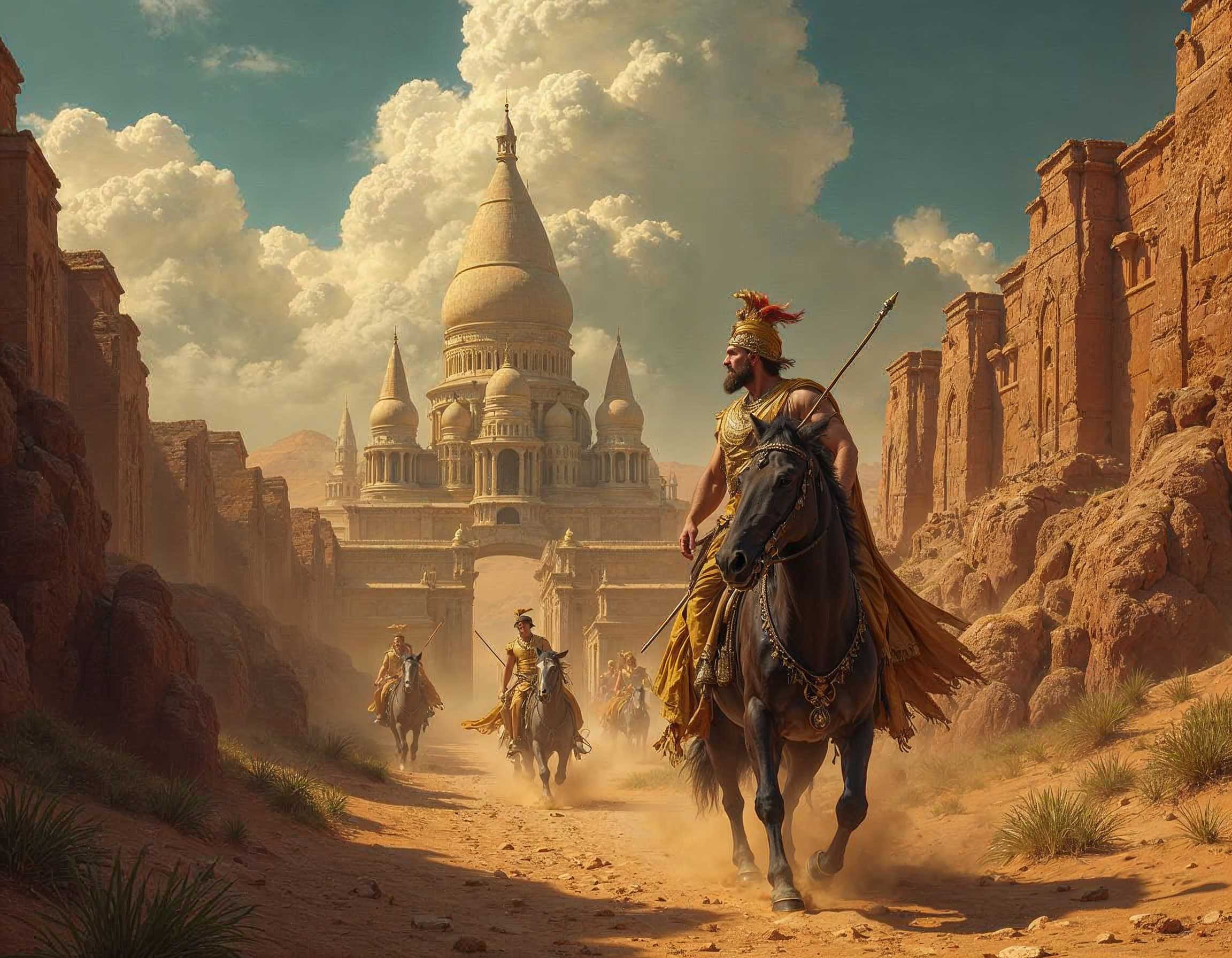Zarathustra - Seeds of Truth
The cold bit deep into Zarathustra’s bones, and snow weighed heavily on his long, curly hair. He trudged through the silent white fields, each step uncertain. He murmured in his heart, “To which land should I travel now? Where can I go? How can I find a way to ease your heart, O good spirit?”

As night deepened over the icy plains, Zarathustra and his daughter Pouruchista trudged onward, their breath leaving faint clouds in the starlit air. They had hoped for even a corner of warm straw behind a farmer’s door, but no hospitality had been offered. Instead, the snow continued to fall, and the wind hissed through bare trees. Pouruchista’s teeth chattered, yet she fought to stay brave. Zarathustra drew her close, sheltering her as best he could with his thin cloak. The ache in his bones reminded him that they had been traveling for many weeks, spreading words few wanted to hear. Still, he believed that truth, once planted, would someday grow strong roots.
They followed a narrow path winding through a valley of silent, snow-laden pines. By moonlight, Zarathustra spotted a distant glow—a settlement of low houses where smoke rose steadily from chimneys. He whispered words of encouragement to Pouruchista, guiding her steps until they emerged at the edge of a small village. The buildings were humble, their rooftops laden with ice, and the sound of distant laughter and voices hinted at warmth inside.
He approached the first dwelling. Instead of knocking, he peered through a gap in the shutters. Inside, a family huddled around a fire, children dozing on their mother’s lap, a father stirring a pot over the flames. Zarathustra tapped lightly at the door. A woman opened it just a crack, eyes cautious. Before she could speak, he said softly, “We are travelers, weary and cold. I have a message of goodness to share, but first we beg only for a safe corner to rest until morning.”
The woman looked at his daughter, shivering yet smiling gently. Perhaps it was Pouruchista’s calm innocence that softened the woman’s heart. She opened the door wider and allowed them in, motioning toward a space near the fire. Her husband eyed them warily, but when he saw that they carried no weapons, he grunted and returned to stirring the pot. The children peered curiously, and the warmth of the hearth spread through the old prophet’s limbs, easing the stiffness of the journey.
They slept on straw mats and awoke to the smell of flatbread and boiled barley. Zarathustra rose early, thanking the family with kind words. He saw that they were simple folk, humble farmers. They asked little, and he offered what he could: the promise that goodness would not go unrewarded in the eyes of the Wise Lord, Ahura Mazda. The husband frowned at the mention of a god he did not know, but the wife was curious. She asked softly, “Who is this God you speak of? We pray to many gods—some kind, some wild. We do our best to please them, but trouble often finds us anyway.”
Zarathustra cleared his throat. His voice was gentle, for he did not wish to frighten them. “There is one who is the source of all good,” he said. “A being who cherishes truth, compassion, and justice. Ahura Mazda, the Wise Lord, opposes all that is dark, cruel, and deceitful. In serving this highest truth, we align ourselves with all that nurtures life and protects the innocent.” His daughter listened quietly, the light of the morning sun catching in her dark eyes.
The farmer’s children came closer, curious. The oldest, a boy with serious brown eyes, asked, “If your God loves goodness, why does this bitter cold persist? Why do we struggle?” Zarathustra knelt and looked into the boy’s face. “We live in a world where the struggle between goodness and falsehood is not yet won. Our task is to choose what is right, even when it is hard. By doing so, we strengthen the light and weaken the darkness. The world changes slowly, one act of kindness at a time. Perhaps your family’s kindness to us will serve as a small flame against the cold.”
They remained in that home for two days, for the snow turned to ice and the wind threatened to topple travelers into drifts. In that time, the family learned more of Zarathustra’s teachings: the importance of good thoughts, good words, and good deeds. He told them that each human being has a choice in life, that each honest act moves them closer to harmony and truth. The wife seemed comforted by his words. The husband remained cautious, but he softened with time, impressed that this stranger sought no payment, made no threats, and seemed genuinely concerned for their well-being.
On the third morning, the wind eased. Zarathustra and Pouruchista prepared to depart. Before leaving, he turned to the family and said, “Your kindness is a lamp in this dark season. I carry it with me. Should fortune guide me, I will speak of your generosity to others. Perhaps, in time, more hearts will open.” The farmer grunted, but there was a flicker of respect in his eyes. The wife pressed a small pouch of dried fruit into Pouruchista’s hand, and the children waved shyly as they stepped out into the crisp daylight.
They journeyed on to another settlement, where people prayed to grim idols carved into blackened wood. Zarathustra spoke with anyone who would listen, describing a faith founded on honesty and reverence for a single benevolent Lord. Some mocked him, laughing at his strange ideas. Others shrugged and turned away, too burdened by daily chores to care for new teachings. But a few listened carefully: a shepherdess curious about a life without fear of vengeful spirits, a stonemason who had grown weary of paying tribute to cruel war-gods, and a young girl who found poetry in his words.
As the seasons turned, the news of this wanderer, this prophet who spoke of a righteous order in the world, spread quietly. He moved on, sometimes sleeping under trees, sometimes granted a corner in a byre, sometimes meeting hostility. Yet he pressed forward, always holding faith that truth, once spoken, could take root in even the hardest ground.
In one village, he confronted priests who wore heavy robes and wielded sharp knives, sacrificing animals to appease their many gods. He asked them, “Is this the will of the highest truth, that innocent life be taken for favor?” His calm but penetrating questions unsettled them. Angry, they threatened him, ridiculed his name. But in the crowd of onlookers, at least one face seemed troubled, as if questioning long-held beliefs.
There were days of hardship. Pouruchista’s feet ached, and Zarathustra gave her his own bread. There were days of wonder, when a passing caravan welcomed them by a great fire, and he found open minds and warm hearts from traders who journeyed far and wide. With each conversation, he planted seeds of thought. Some might never bloom, but others would sprout in distant seasons, shaping future generations.
As the years passed, Zarathustra reached a land ruled by a noble who sought meaning and stability in chaotic times. King Vishtaspa was known to be stern but intelligent. When word of a stranger preaching a faith of righteousness came to him, he summoned Zarathustra to his hall. Before warriors and wise men, the prophet spoke. He shared his vision of the world—of Ahura Mazda’s light and the importance of choosing the righteous path. At first, the court hummed with skepticism. Some scoffed; others listened curiously.
Yet the king, sensing the sincerity and courage in Zarathustra’s voice, asked questions that did not mock but sought understanding. “How,” the king asked, “does your Lord differ from the old gods who demand fear and blood?” Zarathustra answered plainly: “He desires only that we live truthfully and kindly. He does not grow stronger from our sacrifices of flesh, but from our commitment to justice and compassion.” Intrigued, Vishtaspa studied the prophet for a long moment, seeing neither fear nor deceit in his eyes.
In the days that followed, Zarathustra debated with scholars and priests at court. He was tested, challenged, and at times insulted. But he never resorted to anger. He spoke patiently, meeting cruelty with steady calm. Eventually, some of the king’s advisors began to see reason in his words—why should they live in terror of dark spirits if there was one pure source of truth and goodness to guide them?
At last, King Vishtaspa declared that these teachings would be heard openly in his land. He did not command his subjects to follow Zarathustra’s faith, but he allowed them to choose. The prophet’s voice, once carried only by the wind, now had the shelter of a just ruler’s protection. More and more families listened and judged the words for themselves. Pouruchista, grown older and wiser, saw small communities embracing the new faith, celebrating the virtues of honesty, courage, and compassion.
Over time, these teachings of Ahura Mazda—of light triumphing over darkness—began to shape how people lived and thought. Old fears slowly receded, replaced by earnest striving to do what was right. Through hardship and doubt, Zarathustra had shown that by acting with integrity, people could find a surer path through life’s storms.
In the end, after many winters and many changes, the prophet looked out upon a landscape no less rugged than before, but changed in the hearts of those who dwelled there. The wind still blew cold at times, and snow still fell heavily in winter. Yet within warm homes and kindly villages, the name of Ahura Mazda was spoken not with fear, but with reverence and hope. The seeds of truth had taken root, and Zarathustra, remembering the long, difficult journey that began with a knock on a hostile farmer’s door, smiled gently. He knew that goodness, once nurtured, could endure through the harshest seasons.
Make Your Business Online By The Best No—Code & No—Plugin Solution In The Market.
30 Day Money-Back Guarantee
Say goodbye to your low online sales rate!








